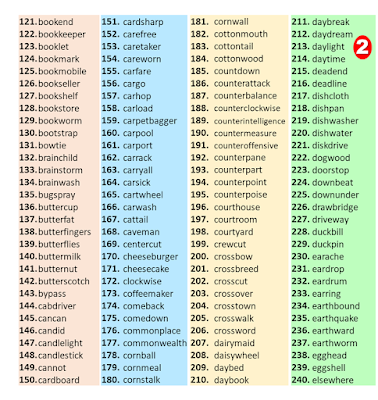When two words are used together to yield a new
meaning, a compound is formed.
Compound words can be written in three ways:
Open compounds (spelled as two words, e.g., ice cream),
Closed compounds (joined to form a single word, e.g., doorknob),
Hyphenated compounds (two words joined by a hyphen, e.g., long-term).
Sometimes, more than two words can form a
compound (e.g., mother-in-law).
The most common spelling quandary English students
face is whether to write compounds as separate words, one word, or hyphenated
words.
The English language has a history of the formation of expressive compound words.
Examples include sun-stroke, pick-pocket, elbow-room, land-lord, humming-bird etc.
The two parts of a compound word are usually separated by a hyphen. However, in the case of many common compound words, the component parts have become so closely connected that they are now written as one word without any hyphen between them.
Examples are: sunstroke, landlord, pickpocket, overload etc.
In the case of some other compound words, complete integration has been achieved by modifying one or both of the component parts.
For example, pass time is now written as pastime. In the same way, holy day has become holiday and prime rose has become primrose.
There are different types of compound words
Examples are: master-piece, table-cloth, maid-servant, bread-winner, shoe-maker etc.
Examples are: wool-gathering, snake-charming, bull-baiting, sooth-saying etc. Noun + adjective Examples are: court-martial, knight-errant
Examples
are: piping-hot, walking-stick, drawing-room, laughing-stock, skipping-rope
etc.
Adverb
+ noun
Examples are: out-patient, over-load, fore-sight, under-tone, in-sight etc.
Examples are: dare-devil, cut-throat, break-fast, spend-thrift, pass-port etc.
Examples are: short-hand, free-thinker, lay-man, hard-ware, strong-hold etc.
Present participle + noun
Examples are: humming-bird, flying-fish, loving-kindness etc.
Examples are: he-goat
(In this case, the apostrophe is usually omitted)
Examples are: sportsman, craftsman, statesman, hair’s-breadth, stone’s-throw










Comments
Post a Comment